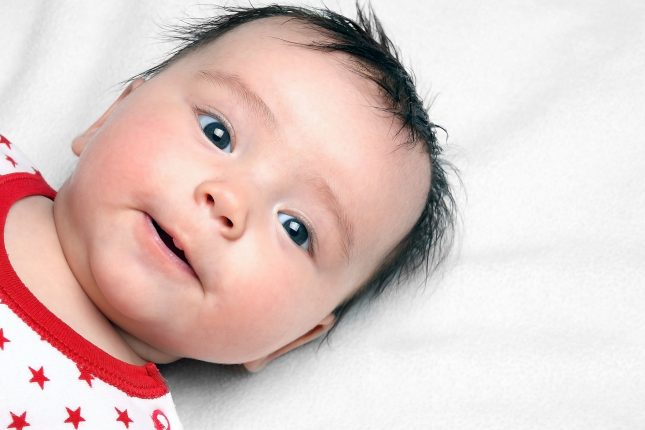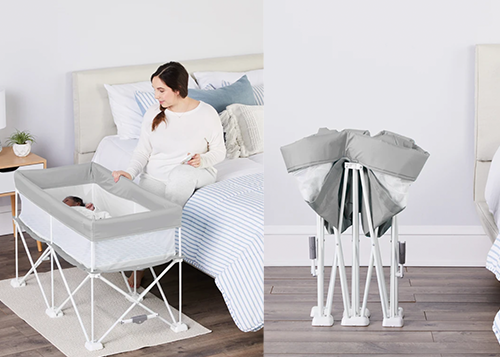Newbies
Sleeping Tips for Traveling with Baby
Sunny Gault 0:02
Your family is traveling, but you have a new baby. And you'd prefer not to have sleepless nights for both you and your little one while you're away. So how do you make sleep work while you're traveling from point A to point B? And once you get to your location, how do you create the best sleep environment possible? So everyone wakes up nice and rested. This is Newbies.
Sunny Gault 1:00
Welcome to Newbies! Newbies is your online on-the-go support group guiding new mothers through their baby's first year. I'm Sunny, I'm a mom of four. And I'm so happy you decided to join us today, we've got a great show in just a bit, we're gonna be talking all about baby sleep. And that is definitely a hot button topic for all you mamas out there. I know I've been there, done that. Now if you haven't already, be sure to visit our website at newmommymedia.com and subscribe to our weekly newsletter, which keeps you updated on all of our episodes that we release each week. And another great way to stay updated is to hit that subscribe button, whatever platform you're on right now. Take a moment, hit subscribe. And if you're looking for a way to get even more involved with our show, then check out our membership club. It's called Mighty Moms. And if you go to our website, you're going to see all the banners there on the front page. That's where we chat more about the topics that we discuss here on our show. And it's a great way to learn more about our recordings. So you have an opportunity to join us live. How fun is that? All right, stay right there mamas. We'll be right back.
Sunny Gault 2:14
Today on Newbies, we're focusing on our baby's sleep, you know, trying to get them to sleep in their own environment. Well, that can be challenging at first. So what do you need to do when you travel? What should you be keeping in mind? Because your environment probably is going to look a little bit different, right? Well, our expert today is Jen Varela. She is a certified general sleep coach and the owner of sugar night night in San Diego, California. Jen has clients not only in San Diego, but across the country and even in other countries, so be sure to check her out online. Jen, thanks so much for joining us. And welcome to Newbies.
Jen Varela 2:52
Thank you for having me. I'm excited to be here.
Sunny Gault 2:55
Jen. We're often told as new moms were told to sleep when our baby sleeps. But when we're traveling, we may be sleeping at different times, perhaps the length of our sleep may be changing. So how important is it to stick to a sleep schedule when you and your baby are away from home?
Jen Varela 3:14
Well, so first of all, I'm just going to say Yay, you get to travel. Right? Okay. Oh my gosh. Right. So I think it's great and new experiences for your little ones is a wonderful thing. Yeah. And so I think, you know, just First of all, the reality is you're gonna have to be a little bit flexible. If you get real tight with it, then it's almost like why even go, because there's going to be lots of things that you'll just have to flex with, right. And it usually takes about three to five days if you're moving into if you're into an another time zone. So rather than getting really rigid on how your schedule is at home, and what it is on travel, there's a couple key things that can just help make that transition as smooth as possible. And so one of those is try mimicking with the awake windows are at home, especially for the last awake window. So instead of looking at it from a 12 hour clock, look at it from if you have a six month old and you normally have your last nap, let's say from five to 530 and so then that time is somewhere between 730 and eight because you have like a to two and a half hour awake window there. Right. Use that to help get you started for anchoring on the new timezone. And, or if you're not in a new time zone still using that so you don't have an overtired baby, when it's time to go to sleep. So if you were going to protect one week window in the day, it would be the last one of the day. Okay, and then you might just want to keep a little log to know overall sleep Cuz once if they get really short on sleep, that can create a lot of havoc, too. So you just want to make sure they don't get too depleted. But instead of getting really crazy about it has to be this schedule. Protecting that last week window is really a big help.
Sunny Gault 5:18
I want to talk a little bit about circadian rhythms. Right, you hear a lot about this. And as adults, I feel like that's kind of a hot button word. You know, we're always trying to get enough sleep and you know, stay in our rhythm, whatever that is. So, for kids or specifically for babies, at what point do babies start to get into that rhythm?
Jen Varela 5:39
So I just think it's so interesting. So Dr. Polly Moore, who I know you're very familiar with, she's been on your podcast before. She talks about how the circadian rhythm The 24 hour rhythms are usually established in the 46 week after conception, or about six weeks after a full term, baby. Okay, so um, and Dr. Jody Mendel, she's a PhD, she talks about two that it's that that circadian timing is really developed over the first six months of life as a result of how the brain is developing, and then social, environmental, and light and dark cycles. So there's a couple different things that really set that circadian rhythm. And it's interesting how like, sunshine plays a role in the brain's production of melatonin. So it is definitely tied to, you know, our hours of daylight. But as far as when their little systems kick in, it's about six weeks. But then it develops over the next six months.
Sunny Gault 6:45
So how concerned Do we need to be with this? I mean, it once it's, you know, I mean, obviously, depends on how old your baby is. But let's say, you know, we're talking to moms now that have really young babies, and that six month or so timeframe, do we really need to be concerned about these rhythms or do they just kind of naturally form and if they get off schedule, how difficult is it to get them back on schedule.
Jen Varela 7:08
So if you look at the the body clock, the way the body clock is set, it's by consistent wake times in the morning and sleep times at night meal placement, so feedings and light. When they're really little, if you feel like they have their day and night mixed up. So they, when they first come into the world, you shouldn't be having like super long night awakenings, I would want you to talk to your doctor about that and talk to the doctor about should you be waking the baby during naps during the day, I don't think you should just do that. To do that. I think if a baby's sleeping, you should let them sleep. However, if you feel like their day nights are mixed up, I would definitely be under the direction of the pediatrician. So one, or the ways you can kind of get their circadian rhythm set is first making sure you're getting sunshine during the day, that's that is going to be the key more than almost anything else. So with older children, you could say, you know, if you can get 20 minutes of sunshine before 10am, that can be really helpful in setting the body clock. So Waking the little one in the morning, again, with the newborns, I'm not really keen on doing that. But if you're getting closer to six months of age, yes, that can be really helpful to keeping a consistent morning wakeup time. And then that feeding schedule also to having that be consistent can really help set the body clock. So taking a look at your day, right we know one day can vary very much like vary from one day to the next. Right. So again, I'm going to go back to that last week window, if things are kind of getting a little crazy, be mindful of where you're placing the last nap so you can get the right awake window. So they don't get that cortisol surge at the end of the day right before bedtime. And then all of a sudden, your bedtimes too late. So being mindful where you place that last nap is also valuable.
Sunny Gault 9:15
Earlier you were talking about changing time zones, and that was a that's a whole other thing that actually didn't even think about in this topic. But there may be some parents, especially if you're hopping on a plane with your baby, you may be going you know on a completely different schedule, right? A light might be your nighttime, you know, wherever you're going, What tips do you have for parents that are completely just getting out of whack because of the time zones and you know, what do you do with your baby at that point?
Jen Varela 9:44
When you arrive at the new place, do what you can to, to watch that last week window for where you're starting that time and then in the morning. You know, depending which way you're shifting it, I wouldn't shift them more than a maximum of an hour trying to get towards the new timezone. Okay, with the wake-up time, okay? It depends on which way you're going on how that looks. But right. Bottom line is, I'm just saying, it usually takes about three to five days, regardless of what you do. Okay, I'm gonna rush it, kinda, I mean, not, not a lot. And then the only other thing that's really interesting is that people that, like, take beach vacations, I often find that like, oh, there's so much more rested. There's something to be said about how we're tied to the earth. And if, you know, with babies, you're not gonna put their feet in the dirt. But if you can, you know, get your feet, like in the sand, you know, get your feet, you know, touching the earth that can really help tie you to that place on earth where you are. Yeah, which can help with a circadian rhythm.
Sunny Gault 10:48
That is so interesting that you said that because my family and I, we love to go to the beach. So here in San Diego, we can go to the beach, we're fortunate. And I have to admit, when we go, I always get sleepy. Yeah, there is something like I hear the waves. I just want to lay down on a blanket and go to sleep. And now that you said that I'm thinking there totally is something connected to that.
Jen Varela 11:10
I think so. And then I'm not sure exactly which one it is. But there's something that the ocean produces. I think it's serotonin, but that it gives you the good feeling. So there's actually we're totally off-topic. But yeah, yeah. But my point is, is that there is fascinating, right? We're tied to the earth and all that's going on, for sure.
Sunny Gault 11:31
Yeah, yeah, and the sounds of the ocean and all that. And we're gonna talk about that a little bit later in the show sounds for your baby. But there is there's something to that. Okay. Well, we'll get back on track. All right.
Jen Varela 11:42
Sorry. I digress.
Sunny Gault 11:43
No, that was me. That was totally me. Okay, so let's talk a little bit about the travel part, like when you're going from point A to point B, let's start with traveling in the car. You know, it's specifically for sleep, right? Because there's a lot to consider for parents as you're traveling. But I know a lot of parents that are like, and this may have to do with slightly older children, but they're like, we're going to hit the road when it's, you know, nighttime out. So you know, the kids will just sleep through it. But from a baby's perspective, like, what kind of travel tips can you give us when driving in a car to wherever you're going?
Jen Varela 12:16
Yeah, so one would be, you know, make sure you're getting an opportunity to have a break, that little one should be out of that car seat every two hours. Okay. So just from, you know, physical health, even wise, and so, you know, make room on your drive for a break. And, of course, never leave a car, a baby in the car by themselves, those temperatures can get hot really fast. And, you know what I would say as far as what you were talking about the timing, I have found, because we we we do long trips, as a family, I would actually leave at like, four in the morning, because they're still probably going to go back to sleep in the car, right. And then you'll have an short wait period of time and get a little breakfast. And then they'll probably be ready for the nap again. And then there you go. So I find timing wise for sleep. Leaving basically in the middle of the night is most beneficial when you're doing a car trip. And then if you're going to somewhere where you know, maybe you from San Diego and now you're going to go to the mountains where the snow is and stuff. Keep in mind that you know when you're putting the little one in the car seat, you want to just have them be in normal layered clothes, then layers you don't want them in the snow suits and all that stuff because it will compress. If there was an accident, so then the straps would be too loose. So I think that's just something to you know, be mindful of to like, how much are you layering your baby? You don't want them to be too hot. Right and that Percy?
Sunny Gault 13:54
Yeah, well, if they're too hot, they're not going to sleep well, right or too cold, whatever.
Jen Varela 13:58
Yeah, some babies will get really really hot and sweat and sleep and that's not good. Yep.
Sunny Gault 14:04
Okay, so that was driving in a car. What tips do you have for parents that are traveling in a plane right? They're getting on a plane with your kiddo. And a lot of times you know when you're getting on a plane or when you schedule your flight, you don't have a lot of control over when you're flying right a lot of times it's that was the only flight available or whatever so yeah, what What tips do you have for parents?
Jen Varela 14:27
Yeah, I mean yes, if you can get that read it so that it's you know, sleeping time that that would be great, right? But if you can't it's fascinating to me, there are four little ones and some airlines have airline bassa nets. And so it's, it's connected to the bulkhead wall right behind the galley. So if you can get one of those sky cots I mean, that's a dream scenario. So it's usually under six months and or under 20 pounds and not able to set up yet. So that's one kind of cool thing. Another is some air, airlines have sleeper seats. And so for an extra fee, you can book three seats in a row and do seat extension. So you're basically creating like a couch, okay. Um, there are also and these are kind of new inflatable seat extensions. So again, you're going to want to check with the So basically, it's an inflatable and allows you a little baby like lay down. But you're going to want to check with the airline as to what they will allow. But definitely during, you know, takeoff and landing, you want them in that car seats. It's, I know that a lot of airlines will let you have a baby on your lap under two years of age, but it's still recommended by the American Association of Pediatrics, that they're in a car seat in the seat, and you can find out if your car seat is airplane compliance. By taking a look at the manufacturer recommendations, it will say if they are airline certified, but you can also look at the FAA website. And there's another one called cares car. Yes. Airplane safety harness for children.
Sunny Gault 16:33
Well, I've seen that before. I've seen that. Yeah, what's nice about that is you've already created a sleep space for them. You know what I mean? Whether they're awake or not, because I remember traveling with my little kids. And a lot of the times it was, you know me, you know, having the baby on my lap. And not only was I completely uncomfortable, but most of the time they were too Although I will say sometimes it was helpful for like, especially when they were really little bit like in the skin or we know there's also so using right? Yeah, for sure.
Jen Varela 17:07
Yeah. One other quick thing to it. Sorry, I forgot to mention was this, you also don't really want them in the aisle seat. Because when they're doing the lever service, that can be a little risky. Oh, yeah. So you want to get closer to the window?
Sunny Gault 17:19
Yeah, that makes a lot of sense. But my kids are older now. But they always want the window anyway. So like you get it in there first. And then I feel I don't know. I feel like I'm kind of protecting them a little bit, you know?
Jen Varela 17:29
Yeah, I get it. There's also you know, the basic one that everybody covers, you know, the ear pain, right? So you might have them, you know, drinking or breastfeeding? Like, how do you do that with them in the car seat and you and your thing? It's a little awkward. But yeah, definitely sucking can make a big difference. Right? When they're, yeah. When you're taking off?
Sunny Gault 17:49
Will babies and I'm sure kind of depends on the baby. But do babies normally wake up with that ear pain? Or can they kind of sleep through that if they're asleep for takeoff and landing?
Jen Varela 17:59
That's a great question. I that might be outside of my area of expertise. Okay, that's for that. I think I would my guests on that would be it's based on temperament. Yeah,
Sunny Gault 18:09
Yeah. And how far deep and asleep are they right? Did I just fall asleep? Are they in that nice, you know, the REM sleep or whatever. Okay, all right. Awesome. All right, we're gonna take a quick break, guys, when we come back, we're going to have more tips to help your baby sleep while traveling. We're going to ask Jen more about how to create the ideal sleep environment so that way, when you get to your location, you know exactly what's needed. Even if you know we're cutting out some of the fancy stuff. Usually when we're traveling right, we need the bare essentials. So we'll figure out what those are when we come back.
Sunny Gault 18:50
Welcome back to newbies we are continuing our discussion with baby sleep expert jen vermelha. from sugar night night, that Jen before the break, we were talking about how to help your baby sleep. When you're physically traveling from point A to point B, we were talking about the car and planes things like that. Now let's assume you're at your location you have arrived. And in theory, you may have more control over the environment. So let's talk about basic sleep necessities. What ultimately do parents physically need for their babies to get the best sleep possible?
Jen Varela 19:25
So I'm always gonna say safety first, right? Safety first. So if you are in a hotel and you're renting a crib, you're going to want to make sure that the crib is up to safety standards. So doing a call ahead and checking if there's any recalls on that crib. I think that's really key. So check that out. The other next piece on that would be some mattresses have a toddler side and an infant side. So make sure you're using the appropriate side if that mattress has two different sides to it. Okay, and You know, if somebody is getting a crib for you, like you're going to a friend's house and they're borrowing a crib or whatever, that recall piece still sticks in place. And then you just want to make sure that when it was assembled that they're just there wasn't any missing pieces, right? So you don't want it collapsing. So from the standpoint of the crib safety first on that, and then with regards to, you know, bedding and all that right, less is more so it should just basically be a fitted sheet, a fitted mattress pad, and baby. So if you need to get them warmer than layer them up with footie pajamas or wearable blankets, okay. And also take a look at is there any like cords within three feet of the crib. So if you're in a hotel, and it's got like the curtains, you don't want them to be able to get their little hands on any chords, so, so keep that in mind. As far as room basics go, you know, 68 to 74 degrees is key. Okay? a dark room is ideal. Hotels, that's pretty easy to do. If you're doing an Airbnb or something like that maybe not as easy. There are some really great products out there for room darkening. They're portable. So you could check out some of that. And then remember that any lights that are blue or green, it tells your brain it's daytime. So you want to see if you can figure out a way to cover up any blue lights you want just like red or amber light. Interesting. Okay, in the room. Yeah, there are travel white noise machines, that can be really helpful. So if you have one that you're using at home, it would be nice if you could bring that with you, especially if it's one that could really travel with you. So unlike tips, I would say one is if you're going to use a pack and play, I like to have them use the pack and pay in their room a few nights before the trip. So they get used to that environment in a familiar room. Okay. So I would do it like three days before I would do two days, then the last day I would do back in the crib, so they get a good night's sleep. Okay, as a backup for safety. If you're like, Oh, I don't know, if that crib is really as safe as I thought it was gonna be. You can always pull the crib mattress out and put it on the floor and sleep next to them where they're on the crib mattress and you're on the floor.
Sunny Gault 22:26
Yeah, I was thinking about that. Because, you know, sometimes you kind of get stranded or maybe it's just me, I have the worst luck sometimes with flights. And I remember so my first son, I was traveling, I think cross country with him. And it was just me and him. And our last flight got canceled. So they put us up in a hotel room. But I was so oh my gosh, Jen, I was so unprepared for this. Yeah. So sometimes, you know, you don't have a chance to check out the crib stuff or whatever. And I think one I think that's actually what I ended up doing. I had a play mat that was with me and I put it on the ground and you know, kind of did a sheet around it, tucked it under because you really wasn't even a fitted sheet right? And then lay down next to him because I was so scared that if I put them on a bed, you know, there was no railings or anything, you know. And you know, he was at that age where he could have rolled or done whatever. And so I thought well, the floor. Yep, the floor makes sense. I mean, I know that sometimes that sounds a little gross. But you know, safety first, right?
Jen Varela 23:30
Yeah. Right. Yep. And on that note, too, I would want to mention, you know, the car seats, they're really not meant for the babies to sleep in those when they're not in the base that goes with it. So, you know, you might think, Oh, well, we'll just have them sleep in the car seat in the hotel room, but they are not sitting in the right position. And there has been some real tragedies with baby sleeping and car seats that are not in their base. So I'm just gonna throw that out there as it would seem like oh, well at least that sanitarian it's better and whatever but it it really wouldn't. You always want to get them on a flat surface.
Sunny Gault 24:07
Okay, so you mentioned pack in plays and I wanted to talk a little bit about pack and plays. You can also have bassinet ads you know, I know we use these in our homes all the time and now they do make products that are nice and compact. I mean I I remember the pack and play that I had when my kids were little was pretty big. It was even hard to get it through doorways. I'm sure they've got better products now. But I loved bassinets I had this for my twins, I had twin bassinet, and man these little things were on rollers and I'd roll these things all around and put them right next to the bed and stuff like that. So these things are lightweight and really compact honestly. So if you guys are wondering, you know, I don't want to rely on a crib being available or something like that. I encourage you guys to check out some of the stuff out there because it really is impressive. I watched a lot of this stuff was around when my kids were little, you know,
Jen Varela 25:03
Yeah, I think they're a great alternative. And just the key is that you just need to make sure that the mattress is firm and tight fitting, so there's no gaps, right? And that the sheet that you're using for that product is designed for that product. Okay, so, so long as you know, that's all lining up, I think that they're fine, whether it's bassinet or a pack and play. It's interesting, because cribs are all made in the same standard size, so that the crib mattresses fit perfectly. But with all these other different products, you know, tight fitting sheet is key, which also is something that I recommend when traveling, if you have a standard crib you're using and you have your standard crib sheet, bringing that with you unwashed can bring a nice scent from home and familiar, right? So I like to say bring that bring that dirty sheet if you're going to use the credit.
Sunny Gault 25:55
Right? Your kid will love you for it.
Jen Varela 25:58
Yeah. So you can check that Consumer Product Safety Commission to know if the particular product of that you're using meets those standards.
Sunny Gault 26:05
Okay, great. There's some other things that get thrown out there, especially a lot of mommy blogs and stuff that I wanted to get your feedback on. So we hear a lot about the sound machines like to improve your sleep. I know you mentioned white noise earlier, but you can have them do all sorts of stuff and play all sorts of stuff. Yep. Typically speaking, do you recommend that especially when we're traveling? You know, I'm thinking if babies have that normally, you know, to your point earlier of taking the sheet with you, right? They have that normally, maybe it helps to have some sort of travel size, something to take with you. But But what do you think?
Jen Varela 26:39
Yeah, so I think if, first of all if, if you're used to having it at home, you want to make the environment as similar as possible on all the senses, right? Yeah. So I think you're probably gonna want it. I do like this whole concept of womb to room. And so when you think about in the womb in that in the audit sound, right? It does sort of mimic that. And so I think in the first year, if it's helpful to be a nice sound, shield from outside sounds coming in, I'm all for it. The key though, is 50 decibels is the very loudest that is acceptable. So the American Association of Pediatrics puts out that they recommend that it's no louder than 50 decibels. And you wanted at least seven feet away from the baby's where the baby's sleeping, okay, so you want to protect their hearing. And on that note, not all babies like white noise, right? So I wouldn't start experimenting with it on vacation. I probably figure that at home, if it's something they like. And then with regards to the sound, I highly recommend as low of a sound you can get as ideal. So like that big huge box fan sound is the most important, you don't want a high zing, zinging sounds, you don't want that. And definitely anything that's looping, you don't want something that is looping or has any high pitches. So I'm not a big fan of even like ocean and that kind of stuff, because it can be looping. And, you know, God forbid, they got a seagull in there. Right. So I'm all for just the low sounds is ideal. And music also could be relaxing, and a good sleep cue that sleeps coming, but it can be intellectually stimulating. So I say do the music before you do the lights out. And then keep in mind too, there's like these different ones out there that will be on for like 45 minutes, and then they turn off. Well, that could be disruptive to your charts that because if they fell asleep one way they transition and sleep cycles, and now that sound is not there, it could be really stimulating. So if you're going to use something when they fall asleep, then I'd say use it all night.
Sunny Gault 28:59
Oh, okay. I haven't heard that before. Makes you wonder why they have these things that timeout, you know?
Jen Varela 29:05
Yeah, I don't know. I think it's maybe they thought on you know, you're gonna do a 45 minute walk in the stroller? I don't know. Yeah. It does just crack me up that all the baby monitors seem to have like blue and green lights.
Sunny Gault 29:20
They obviously did not talk to a baby sleep expert.
Jen Varela 29:24
Come on. On, right. It just cracks me up like all of this development products and everything seriously. So
Sunny Gault 29:33
yeah. Sometimes the sound machines, they also have these images, like they can project images like stars and sheep and all this kind of stuff on the ceiling. I realized that can be stimulation.
Jen Varela 29:46
Again, I think during the bedtime routine as a cue sounds great, but I just think that they have to then look for that in the middle of the night that in and of itself could be stimulating. So okay, I'm kind of a Debbie Downer on that.
Sunny Gault 30:00
That's okay, we need to know this stuff. And the other thing I heard mom's talking about online, we're having soothing smells in the room. So I'm assuming some sort of aroma therapy kind of stuff. What do you what do you think about that?
Jen Varela 30:14
Well, so we start from the safety side first, and then I'll finish on the other side. So, newborn senses smell is significantly more sensitive than older babies. And so we also know that fragrance products can be risky because their little lungs are still developing. And they could be an irritant. So prior to three months of age, I'm gonna say, That's not to use anything, okay. Um, however, when you're at an age where you feel like your doctor is going to give you the thumbs up. Smells are very special sensory input, and they affect the brain differently than any other sense. And it can do this lovely connection with the conscious and unconscious brain in the limbic system to do memories and feelings. And so it can be a lovely way to cue, it's time to go to sleep because you're in the sleep zone. Right? So there, there's something to be said, about creating these rituals. And one of those can be smell. And lavender and chamomile are great. I mean, vanilla and rose smell lovely. Rosemary can also be another really nice one. So I think if you are past three months of age, you get the thumbs up from your pediatrician. I think it can be lovely.
Sunny Gault 31:38
This is awesome. So thank you, Jen. This was really good information. I know our listeners are gonna love this mamas Be sure to check out Jen's website. It's sugar, night night.com. And remember, you know, she does stuff online, she can do consultations and stuff online, so it really doesn't matter where you're located. If you'd like to work with Jen, be sure to check out her website for more information. And you can also visit our website, which is new mommy media.com. And you can search for Jen because Jen has been on our shows quite a bit. And if you search for Jen, you're gonna see all the other episodes she's done with us, so be sure to check that out. That wraps up our show for today. We appreciate you listening to newbies. Don't forget to check out our sister shows we have preggy pals for expecting parents, parents savers for moms and dads with toddlers, the boob group for moms who give breast milk to their babies and twin talks for parents of multiples. Thanks for listening to newbies your go to source for new moms and new babies.
Disclaimer 32:40
This is been a New Mommy Media production. The information and material contained in this episode are presented for educational purposes only. The opinions expressed in this episode are not necessarily those of New Mommy Media and should not be considered facts. Will such information and materials are believed to be accurate. It is not intended to replace or substitute for professional medical advice or care and should not be used for diagnosing or treating health care problem or disease or prescribing any medication. If you have questions or concerns regarding your physical or mental health, or the health of your baby, please seek assistance from your qualified health care provider.












